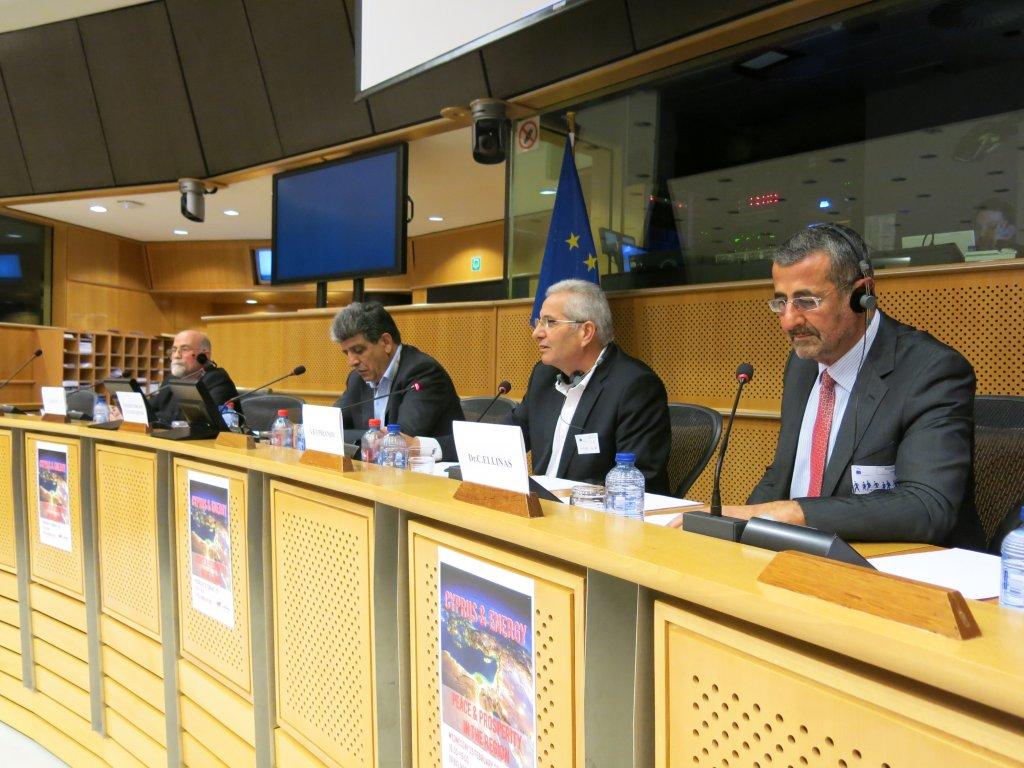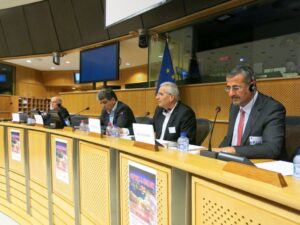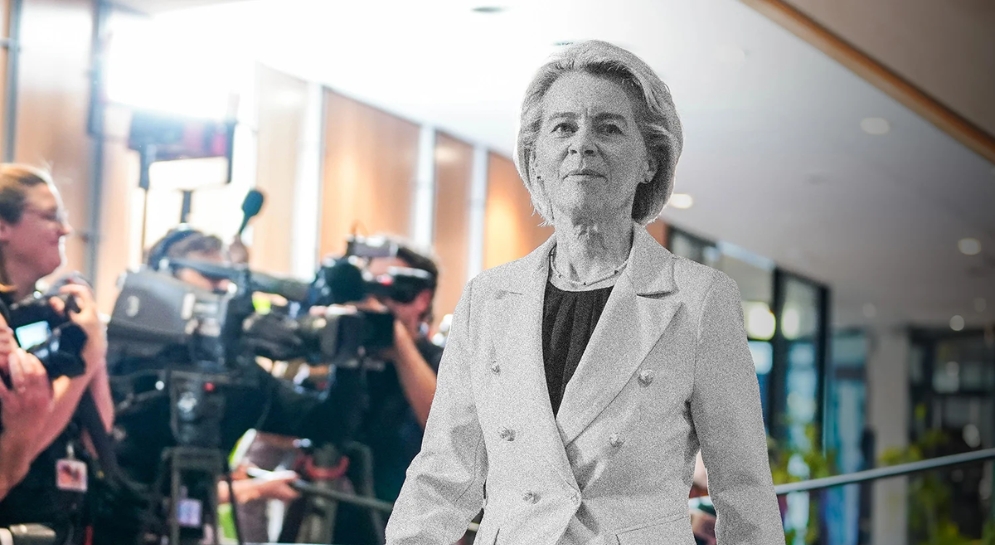
Speech of Andros Kyprianou, General Secretary of the C.C. of AKEL, at the Hhearing “Cyprus and Energy: Peace and Prosperity in the region”
25th February 2015, Brussels, European Parliament
 Permit me to express our joy as we are once again in the European Parliament organising an important meeting on our country. I would like to thank the Group of the Left and personally it’s President Gaby Zimmer who are co-organising with us the meeting and are participating in it.
Permit me to express our joy as we are once again in the European Parliament organising an important meeting on our country. I would like to thank the Group of the Left and personally it’s President Gaby Zimmer who are co-organising with us the meeting and are participating in it.
The recent developments on the Cyprus problem are extremely worrying. For approximately six months now the negotiation procedure has been suspended because of Turkey’s provocative actions in the Exclusive Economic Zone (EEZ) of the Republic of Cyprus.
As you know, Turkey is challenging a big part of the north-western section of the EEZ, considering erroneously by definition, that it belongs to her. In the past Turkey has repeatedly proceeded to take concrete actions in the region in question that violate the United Nations Law of the Sea. Nevertheless, the recent provocations are the most serious ever.
This time Turkey has gone too far. It took a second step and issued two successive NAVTEX designating regions in the part of the EEZ of the Republic of Cyprus, which it does not assert for its own behalf, but considers that it represents an EEZ of the pseudo-state in the occupied areas. It overlooks of course that we are in fact talking about an illegal entity that is not recognised by any other state in the world other than Turkey itself. All other in the world recognize that the occupied areas, consequently the EEZ as well, belong to the Republic of Cyprus.
Turkey did not stop there, but went further. It also proceeded to take a third action, given that for the first time it designated a part of the EEZ of the Republic of Cyprus which it never questioned or challenged in the past, neither for its own benefit, nor for the benefit of the pseudo-state. I am referring to the part of the EEZ facing the free southern shores of the Republic of Cyprus. More specifically, Turkey proceeded to designate the biggest part of the southern coastline of the Republic of Cyprus, very close to our territorial waters and in front of the drilling of the ENI-KOGAS Company which is fully underway.
Turkey’s intolerable provocation objectively affects the negotiation procedure; a provocation that is rendered even more unacceptable given that it was carried out on the eve of the beginning of the substantive round of the talks last October, with the procedure and methodology to be followed already agreed. Turkey knew, or at least should have known, that with its actions it was Turkey itself that provoked the suspension of the negotiations.
I would like at this point to stress that the suspension is one thing and the definitive termination of the talks is something completely different. Our long-standing position is that inter-communal talks under the auspices and within the framework of the United Nations are the only way to solve the Cyprus problem. Given that for AKEL the solution of the problem is its highest priority we could never have consented to a termination of the negotiation procedure.
In our opinion, the suspension of the talks was imperative so that everyone would realise that actions of such magnitude, such as the last one, not only do not help but seriously damage the efforts for a solution of the Cyprus problem. I am not only referring to the negotiation procedure as such. It provokes, among other adverse effects, justifiable feelings of disappointment and mistrust inside the Greek Cypriots as to Turkey’s real objectives. Consequently, I address an appeal to all those who can exercise their influence on Turkey. It was Turkey and not President Anastasiades who led matters to the extremely undesirable point of the suspension of the negotiation procedure. Turkey fuelled the crisis and it is Turkey that must defuse it. The principal task is to find a way to revoke Turkey’s provocative actions so that the resumption of the negotiations will be possible without any side humiliated.
What was Turkey’s goal when it took the specific action? First, it was to send out a message that the utilisation of the natural gas cannot be done without its own participation. Second, it sought to blackmail a solution of the Cyprus problem that would totally suit and serve her interests. AKEL’s position is very clear. We are ready for a solution any time; however not any kind and type of solution. We want a just, workable and viable solution as provided for by the relevant UN Resolutions, the High-Level Agreements, International and European Law. We will not abandon our sovereign right to utilise our natural wealth. If Turkey wants to become a potential part of the procedure to utilise it, she should cooperate with us to achieve a solution of the Cyprus problem as soon as possible.
Why did Turkey believe that it could carry out this provocative action without the international community reacting strongly? Because it considered that the conditions were favourable for her to attempt to gain rewards from her declared intention – which so far has remained for the time being an intention – namely to assume, with rewards, a role in combating the “Islamic State”. Evidently Turkey considers that the international community is completely dependent on her and therefore will not be in a position to exert effective to prevent her.
However, there are other reasons why Turkey decided to undertake an illegal action of such magnitude. To understand these reasons I consider it necessary to make a brief review of the recent past.
We were always saying that the only realistic way for our Turkish Cypriot compatriots to also benefit from the natural gas is the solution of the Cyprus problem itself. As AKEL we are doing our upmost towards this end. During the Presidency of Demetris Christofias we demonstrated that we could move forward.
We sought and achieved an agreement with Talat on the issue of the maritime zones. All the zones without exception, including of the EEZ, will constitute a federal competency. This convergence is mutually beneficial: on the one hand it safeguards the single sovereignty, single international personality of the future federal Republic and on the other it guarantees co-management of the relevant issues. In combination with the convergence that the natural resources, which by definition includes natural gas, will also constitute a federal competency, as well as the convergence on the allocation of the federal revenues, it is clear that with the solution of the Cyprus problem the natural gas issue will basically be resolved – provided that the before-mentioned convergences are respected. This is the most convincing reply to Turkey’s position that the natural gas belongs to the Turkish Cypriots as well.
However, this is not all. Three chapters were almost agreed between Christofias and Talat (Governance and Power sharing, the Economy and European Union issues). From there on, you know very well that the reason why no progress was recorded on the rest of the three chapters was the Turkish Cypriot side’s insistence on not discussing comprehensively the territorial issue before all the other chapters were agreed. This unavoidably also obstructed progress on this chapter inextricably linked to the property issue, whilst it referred the chapter of security to a multilateral meeting.
When Mr. Eroglou assumed the leadership of the Turkish Cypriot community he destroyed the convergences and as it is generally acknowledged he was the one that led the talks to a deadlock, bearing the sole responsibility. In these conditions Turkey was finding it hard to proceed to convergences such as the last one.
What followed is well-known. When Mr. Anastasiades won the presidential elections, AKEL from the outset urged everyone to continue the talks from where they had left off. We were warning that negotiations from scratch/zero would render the negotiation procedure unproductive and unending, as well as including the danger of the Turkish Cypriot side bringing back partitionist positions that had been excluded with the convergences agreed. In the final analysis either we would have been led to a deadlock, or “well-wishers” would have found fertile ground to attempt to impose a solution to their own liking and serving their interests.
Two years have passed since then and developments themselves are confirming regretfully the fears we had expressed. The procedure that was pursued resulted in the widening of the gap between the two sides. Eroglu all of a sudden, and playing it safe, transformed himself into a passionate advocate of the convergences, accusing the Greek Cypriot side that it had destroyed them. At the same time he brought back partitionist positions to the table that clash with the convergences.
I reiterate that AKEL’s position was, and remains, that the negotiation should have continued from where it had left off and the pending core issues should be discussed. It was however expected that since a common denominator on the convergences could not be found at some point an attempt would be made to breach the deadlock in different ways. Hence, it was agreed that the endless discussion regarding the convergences should be abandoned and the core pending issues should be discussed.
AKEL clarified repeatedly that it supports the negotiation procedure, given that it represents the only available way to find a solution of the Cyprus problem. Therefore, despite the fact we do not consider as appropriate the procedure that was agreed with the bypassing the convergences, we could not disagree with it, since such a move would have been tantamount not only to a fundamental, but also procedural deadlock.
The most pressing need right now is to address the Turkish provocations, lift the faits accomplis so that the resumption of the negotiation procedure can be resumed. AKEL submitted a comprehensive proposal towards this end, focusing on the reconfirmation of the convergences, but also the provision of incentives both towards the Turkish Cypriot community and Turkey itself. For various reasons, our proposal did not proceed. However to be fair I must mention that in the course of events President Anastasiades included its core elements in his own following proposals that had been submitted before the renewal of the Turkish NAVETEX at the beginning of the year. In addition, he took another step and accepted to discuss the issue of the hydrocarbons during the final stage of the negotiations, something which provoked justified reactions on the domestic front.
The discovery of hydrocarbons in the Exclusive Economic Zone of Cyprus offers the possibility to our country to join the world energy map, to become a factor for peace in the region. Cyprus’ Natural Gas, together with other reserves in the region, opens up prospects for our country’s substantive contribution to the energy security of the European Union.
Taking into account that two thirds of the natural gas consumed by the European Union is imported, with its needs in energy growing daily, as well as its dependence on 2 of its main suppliers, it is now clear that the EU is trying not only to safeguard its stocks, but at the same time to also increase its supplies. Therefore, Cyprus will have a significant role to play, if we also take into account the factor of geographical distribution.
Explorative and confirmatory drillings by the Noble Company have now confirmed reserves of Natural Gas in Block 12. In addition, explorative drilling is currently underway by the ENI/KOGAS Companies and contracts have been signed for new explorative drilling operations.
Over the last two years we had a number of negative results in the search to find Natural Gas, namely the non-finding of recoverable reserves in Block 9 by the ENI/KOGAS Companies and TOTAL’s inability to find drillable geological structures in Blocks 10 and 11.These developments do not satisfy anyone, nonetheless they are not and must not be considered as the end of the efforts for research and utilisation of our country’s natural gas. International experience demonstrates that a great deal of effort, time and unsuccessful attempts are required to make this feasible.
AKEL’s position is that on its own the confirmation of hydrocarbon reserves in the EEZ does not mean anything. What is important is the way you manage to utilise and exploit them commercially to the benefit of your people.
Although the current government has overturned and reversed actions and a comprehensive plan that had existed on the means of utilising the region’s natural gas, nonetheless as AKEL we insist that there are still possibilities and opportunities for Cyprus to become an energy hub in the region. We urge the government to act with more determination and consistency in the elaboration and implementation of an overall strategic planning; a planning that will include the optimal use of the confirmed reserves in Block 12, but also in any new reserves that will be discovered along the way.
We do not lose sight of the fact that Turkey wants to be the crossroads of the transfer of natural gas to the European Union.
The natural gas discovered in our region has its own huge significance in these plans. As AKEL we categorically state that any thoughts that may be made by certain circles and forces about transferring Cypriot natural gas to the European Union through pipelines from Turkey is not debatable so long as the Cyprus problem remains unsolved and as long as Turkey continues to illegally occupy Cypriot territory. Only after the solution of the Cyprus problem can such a development be discussed and a decision taken whether it is technically and economically feasible.
The recent developments demonstrate yet again the pressing need for a solution of the Cyprus problem; a solution that will provide for the withdrawal of the occupation troops and the settlers; a bi-zonal bi-communal federal solution with political equality as set out by the relevant resolutions of the UN Security Council; a solution that will safeguard a single sovereignty, a single international personality and a single citizenship, as well as the respect of the human rights and fundamental freedoms of all the citizens of the united Republic of Cyprus.
I address an appeal to all of you to continue to support us in our just and difficult struggle. The solution of the Cyprus problem within the afore-mentioned framework is in the interests of both communities, but also of Greece, Turkey and all the peoples of our troubled region.
Read related:
Hearing “Cyprus and Energy: Peace and prosperity in the region”




